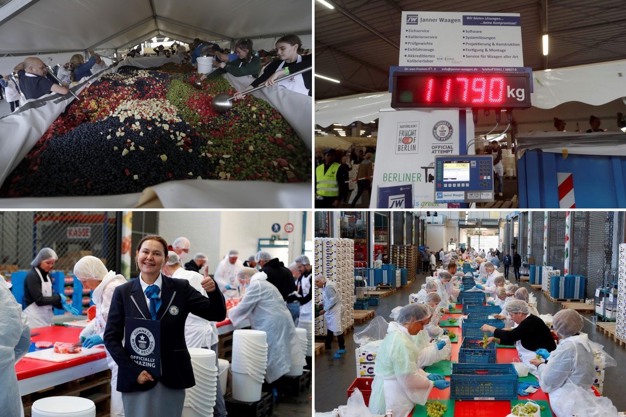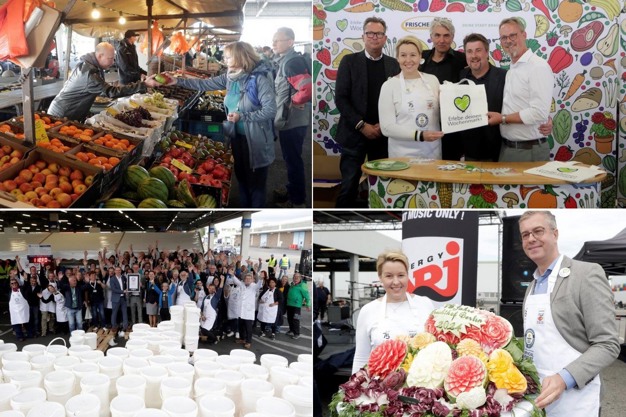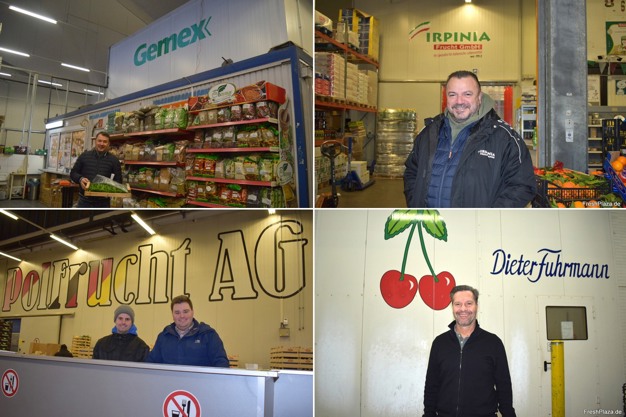Fruchthof Berlin celebrated its 75th anniversary on 15 September with a successful world record attempt and numerous invited guests. With around 100 market companies (including around 50 fruit wholesalers), a total of 2,000 employees and an annual turnover of around 220,000 tonnes, Fruchthof has been one of the most important fruit and vegetable handling centres in Germany and Central Europe for decades. But in a highly competitive market, it is important to constantly reinvent yourself and adapt to the circumstances, emphasises Nils Doerwald, CEO of the Fruchthof management cooperative.

At 4.28 pm, the time had come: "Mrs Seyda Subasi-Gemici, official Guinness World Records record judge, certified that we and the 400 or so volunteers are 'officially amazing' and that together we have prepared the world's largest fruit salad. The old world record from France was beaten by almost 1.5 tonnes," says Doerwald.
From 1949 to 1965, the cooperative initially traded from the Mariendorf site. Since the spring of 1965, Fruchthof Berlin has been located on the wholesale market site in Beusselstraße. Since the early years, the most important customer groups have included the weekly markets and specialist shops, which are still loyal to Fruchthof today. A major upheaval within the customer base took place in the 1990s, when food retailers increasingly began to set up their own supply structures. "On the one hand, this posed major challenges for many market companies that had previously specialised in food retail, and on the other, it opened up new opportunities for other companies," says Doerwald. Today, Fruchthof's customers include the HoReCa and community catering sectors (hospitals, retirement homes, school catering, etc.). Another milestone in the history of Fruchthof was the refurbishment and fundamental modernisation of the central market hall in 2008, from which Fruchthof still benefits today.
Despite permanent full capacity utilisation, a 'healthy, minimal fluctuation' can always be observed. "Unfortunately, the last remaining founding member of the cooperative disappeared last year. At the same time, we were able to attract a new tenant for our hall who specialises in the Arabic range, including nuts, dried fruit, drinks and non-food products. Due to the strong growth of the Arab community in the Berlin-Brandenburg metropolitan region, we are seeing a rapidly growing demand for these products, which we can now fulfil accordingly. This is also very important to us, as the continuous expansion of our product range is also an important cornerstone of our future strategy."

At the anniversary market, around 7,000 changing visitors enjoyed a varied stage programme with live music, a DJ and other acts at 48 stands. The two senators, Ms Franziska Giffey (Economy) and Mr Stefan Evers (Finance), were also guests, opened the festival and assured the Fruchthof of the necessary political support in the future.
Fruchthof of the future: urban farming at the existing site?
In addition to the traditional trade in fruit and vegetables, the management of Fruchthof is also open to new concepts. For example, there have already been companies operating manufactories (including fresh-cut products) on the wholesale market site for several years. "I personally believe that growth in the convenience sector will continue and that new topics, such as AI-supported, urban food production, will gain in importance in the future and could fundamentally shape the next two decades. In this case, I hope that Fruchthof will be able to find suitable partners who want to realise these concepts on site so that production and distribution can take place at one location. The basic prerequisite for the realisation of such concepts would be a corresponding sales structure on the one hand, but also the availability of skilled workers on the other. The latter would not be a problem here in Berlin, with several universities and numerous scientists."
The idea of building a new, modern wholesale market in Berlin on the site of the former Tegel airport has now been put aside by the Fruchthof cooperative and the other wholesale market companies, as Doerwald explains. "We have agreed with the Senate to develop this site further. It won't be the most modern wholesale market in Europe, as once planned, but at least we will have a site that will continue to function for the next 30-40 years." A comprehensive restructuring of the entire wholesale market site (330,000 square metres) on Beusselstrasse is now planned, of which the Fruchthof comprises just under a third (90,000 square metres). Construction is scheduled to begin in 2028 and will take around ten years in total. "An intelligent arrangement of the buildings and transport routes is crucial to further utilise the potential that, I believe, is available," Doerwald continues.

Berlin retailers during FreshPlaza's visit to the wholesale market in February 2023.
Digitalisation in the fight against staff shortages
The increasing shortage of staff hangs like a sword of Damocles over businesses, both for traditional wholesale customers and for the wholesale companies themselves. "For example, many catering businesses have been forced to reduce their opening hours because they don't have enough staff. At the same time, the shortage of staff is also making itself felt in the wholesale companies themselves, especially in logistics and order picking, which in turn could also be due to the unattractive working hours." According to Doerwald, an increased focus on digital solutions is essential to provide the best possible support for the existing workforce and pool resources. "Our first task is therefore to equip the halls with fast fibre optic internet and thus offer our market companies the opportunity to use digital solution tools for digital payment. Whether they then want to use these systems in practice is, of course, ultimately their decision."
Photo credit: FRUCHTHOF BERLIN
For more information:
Nils Doerwald
FRUCHTHOF BERLIN
Management cooperative eG
Beusselstraße 44 N-Q
10553 Berlin
Phone: (030) 395 50 07
Fax: (030) 395 36 58
E-mail: [email protected]
Web: www.fruchthof-berlin.de
